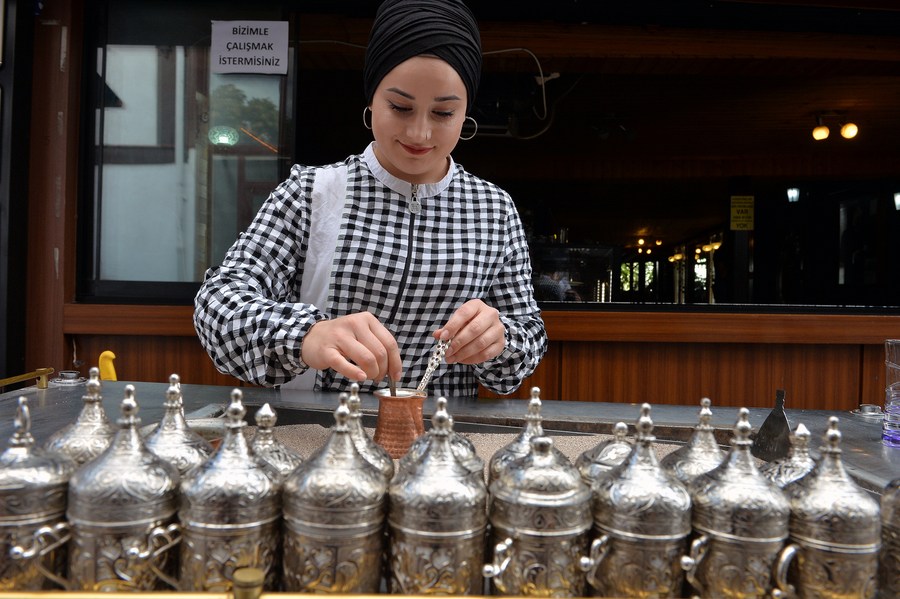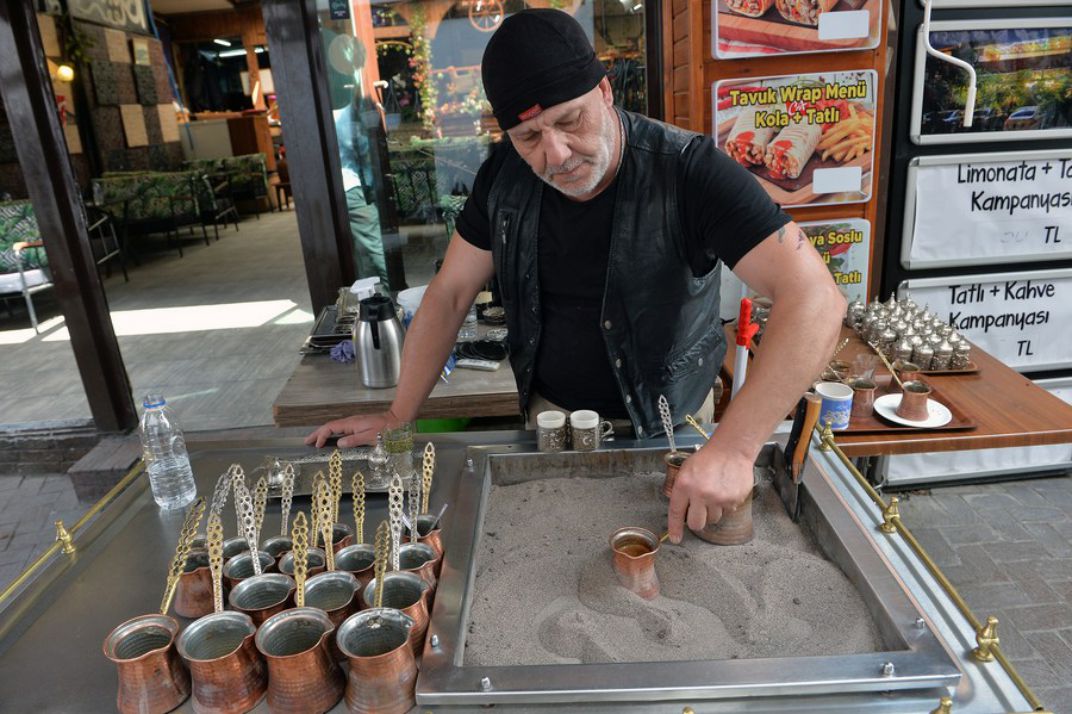Ahmet Putin, a coffee maker at a coffee shop in the area, shared: "A coffee lover will enjoy unsweetened Turkish coffee, to fully enjoy its characteristic bitter taste."
Not just a drink
Turkish coffee "is not just a drink," Seden Dogan, an assistant professor at the University of South Florida and a native of safranbolu, northern Turkey, asserted. She calls it a "connecting tree" because in a cup of coffee, people can comfortably share all the joys and sorrows in life.
Nowadays, in Turkey, inviting each other to "drink coffee" is not only an invitation to go out drinking water but also a Promise of friendship. A cup of proper Turkish coffee must be cooked slowly and meticulously, served in a small, hot, foaming cup, accompanied by a glass of water and a piece of sweet lokum candy to balance the bitter taste.
Coffee is served in small cups, but you need to drink it calmly and slowly, not in a hurry like expressso. This gives the coffee beans time to settle down and keep them at the bottom of the cup.

The most interesting thing is probably the end, when the coffee is done, the cup is put back on the plate so that the coffee beans settle down. People call it the art of reading fate from a cup of coffee (tasseography). The shape of a fish signals luck, a bird evokes a long trip. Although only symbolic, this is still a popular ceremony, bringing more joy than prediction.
While fortune-telling is often not encouraged in Islamic culture, fortune-telling through a cup of coffee is considered a folk, popular entertainment in the community - Kylie Holmes, author of the book "The ancient art of fortune-telling".
Coffee rituals in Turkey are still associated with traditional marriage. During the engagement ceremony, the future bride will make coffee for the groom and his family. The young man's cup was usually given... a pinch of salt. If he had finished drinking without complaining, he would have been considered a patient, mature person and worthy of being a good husband.
History of intangible cultural heritage coffee
Turkish coffee is a heritage that has existed for more than 500 years and has been recognized by UNESCO as an intangible cultural heritage of humanity.
The story of this heritage drink does not originate from Turkey, but from Yemen. In the 15th century, Sufi enlighters are believed to have used coffee to stay alert during long nights of praying and performing rituals. Since the Ottoman occupation of Yemen in 1538, coffee has followed Emperor Suleyman to Istanbul. Just a year later, coffee beans appeared in Constantinople - the ancient city that today is Istanbul.
By the 1550s, the first kahvehane (coffey shop) had sprung up in Istanbul. The popularity of the new drink quickly reshaped cultural life. The Ottoman cezve-ibrik coffee brewing method has become a typical mark of traditional Turkish coffee. As culinary researcher Merin Sever explains, the basic difference between traditional coffee and other types of coffee is the cezve-ibrik method, which is basically cooked with a long-rolled pot placed on sand or hot coal, giving a rich flavor, smooth foam, creating a unique drink.

Despite being banned for concerns about being a place for political discussion, "kahvehane" cafes have never disappeared. On the contrary, they become a gathering place, exchanging news, debating, and of course - starting endless stories on the side of a rich cup of coffee.
Coffee quickly spread to the west. Venice people may have known it first through their trade relationships. Londoners (UK) are the same, in 1652, a coffee shop that was said to be the first in the city in St. Petersburg. Michael has debuted. With just a penny, customers can drink as much as they like and participate in vibrant conversations, like kahvehane in Turkey.
Despite its rich history and cultural significance, Turkish coffee has not yet become a global brand like expressso. Culinary researcher Sever believes that this heritage drink needs to be innovated to reach global. However, there are also opinions that disagree, affirming that tradition must be protected.
Nowadays, from London to New York, many people are looking to bring Turkish coffee to the world. seminars, coffee shops experience, even coffee cup fortune-telling services appear, preserving a cultural heritage that is both ancient and modern.
In Istanbul, visitors can easily find a original coffee experience: A cezve placed on hot sand, thickly covered with fog, with a glass of water and sweet plaid. And when a cup of coffee is drunk until the last drop, the rest is not just the bitter taste - but the warm feeling of a story that has just been shared.











